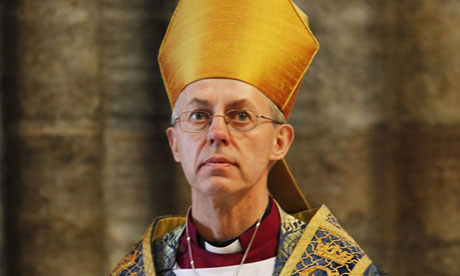The
church, which claims to have a strong ethical investment policy that
explicitly bans companies involved in payday lending, invests in Accel
Partners, the US venture capital firm that led Wonga’s 2009 fundraising,
the Financial Times has learnt.
A Lambeth Palace spokesperson said: “We are grateful to the Financial Times for pointing out this serious inconsistency of which we were unaware. We will be asking the Assets Committee of the Church Commissioners to investigate how this has occurred and to review the holding in this pooled investment vehicle.”
It also said it would ask the Church Commissioners to investigate whether there are any other inconsistencies in its portfolio.
The Church’s plan revolves around opening its network of 15,000 church premises to existing credit unions and offering volunteers to help run them.
Returns on its endowment rose to 9.7 per cent last year, beating its target of 5 per cent plus inflation and the 2.9 per cent returned in 2011. That improvement reflects a conscious effort by the endowment to diversify. Between 2010 and 2012, allocations to hedge funds have more than doubled to about 10 per cent of capital.
A Lambeth Palace spokesperson said: “We are grateful to the Financial Times for pointing out this serious inconsistency of which we were unaware. We will be asking the Assets Committee of the Church Commissioners to investigate how this has occurred and to review the holding in this pooled investment vehicle.”
It also said it would ask the Church Commissioners to investigate whether there are any other inconsistencies in its portfolio.
In a section of its 2012 annual report
on prohibited investments, the Church said: “The new policy on high
interest rate lending extends the exclusion on investment in doorstep
lending companies to cover companies engaged in payday loans and
pawnbroking.”
The Church’s investment is worth only a few million pounds according
to someone with knowledge of the portfolio – representing only a tiny
proportion of its overall £5bn.
However the existence of the investment will undermine pledges by Justin Welby, the Archbishop, to compete Wonga “out of existence” by throwing the weight of the Church behind credit unions.
Archbishop Welby has been a prominent critic of short-term lenders,
and has previously supported the introduction of a cap on the amount an
individual can borrow from these companies.
In an interview with the magazine Total Politics
published this week, he revealed he had met with Errol Damelin, founder
and chief executive of Wonga, to inform him of the Church’s plans to go
head-to-head with him on short-term loans.
“I said to him quite bluntly we’re not in the business of trying to
legislate you out of existence, we’re trying to compete you out of
existence,” said the Archbishop.The Church’s plan revolves around opening its network of 15,000 church premises to existing credit unions and offering volunteers to help run them.
The Church has played an increasingly active role
in the debate over ethical banking in recent months, both as an investor
and because Archbishop Welby was an outspoken member of the Parliamentary Commission on Banking Standards.
It said in its annual report in May that it had voted against pay
packets at more than half the UK annual general meetings it attended and
had singled out Barclays for “intensive engagement” because the bank
had “repeatedly let down society”.Returns on its endowment rose to 9.7 per cent last year, beating its target of 5 per cent plus inflation and the 2.9 per cent returned in 2011. That improvement reflects a conscious effort by the endowment to diversify. Between 2010 and 2012, allocations to hedge funds have more than doubled to about 10 per cent of capital.
Accel invests in fast-growing technology companies and its investments have included Facebook,
Spotify and Etsy. It invested in Wonga in 2009 as part of a $22m
fundraising that also involved Greylock Partners and Balderton Capital.
Wonga has come under fierce criticism from MPs and
regulators for the high interest rates it charges on short-term loans.
It is one of the lenders involved in a Competition Commission probe after the Office of Fair Trading found serious flaws in the way the industry markets its loans.
